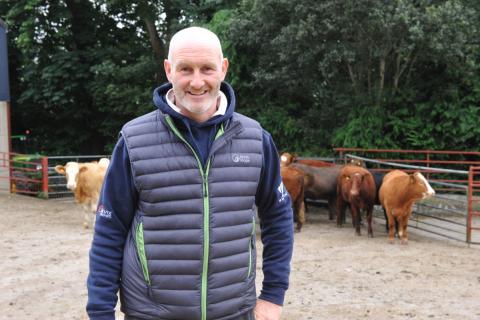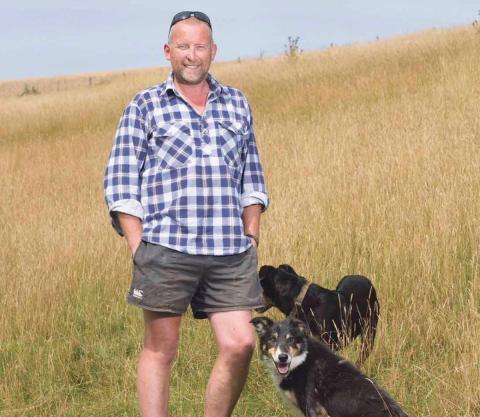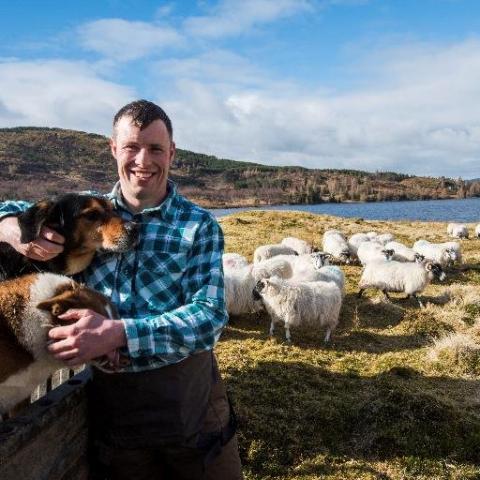18 January 2019
Three farmers who have travelled the globe researching topics ranging from soil health to conservation grazing will present their findings at the Wales Farming Conference in February.
Powys livestock farmer Richard Tudor will be joined on the conference platform by fellow Nuffield Scholars, Welsh-born lamb producer Geraint Powell and Scottish livestock and poultry farmer Alexander Brewster.
All three were awarded Nuffield Scholarships and, having recently presented their findings at the Nuffield Farming Conference in Glasgow, they will present again for Welsh farmers on the Royal Welsh Showground in Llanelwedd.
Richard, who studied the health and fertility of grassland soils, is putting his research into practice at Llysun near Welshpool.
The upland holding, a Farming Connect Demonstration Farm, is currently being converted from beef and sheep to dairy.
Richard said there is growing recognition of the importance of grazing in maintaining and improving soil health.
“Understanding the chemical, physical and biological properties of soil is key to improving upland grassland livestock performance and adopting best practice grazing techniques,’’ he said.
“As livestock farmers, our general knowledge and understanding of soils is limited and working with naturally acidic soils, changing weather patterns, heavier machinery and disappearing soil biology there is an urgent need for greater knowledge of the relationship between our soils and growing healthy plants, healthy livestock and a healthy environment.’’
His study took him to countries with similar climatic conditions to the UK, including New Zealand, Australia and North America.
For Geraint Powell, his research revolved around conservation grazing, the potential for payments for ecological services and the re-introduction of livestock into arable systems.
Geraint, who was brought up on a family in the Brecon Beacons and now lambs 4,200 New Zealand Romney ewes in the Cotswolds, studied best practice techniques for developing systems that are productive and profitable but that also achieve environmental targets set out by regulatory bodies.
“What sparked my interest in this subject was what I have been doing for the last 12 years, which is grazing stewardship land as a grazier and balancing productivity with environmental prescriptions,’’ he said.
The compromise between productivity and conservation is a subject that needs to be studied and addressed, he added.
“A balance of cropping, grazing and conservation can be achieved that can be both productive and ecologically diverse which can produce food profitably,’’ said Geraint, who studied in North and South America, Mongolia, Europe and the UK.
Alexander Brewster manages 5000 hectares of Less Favoured Area (LFA) land in Perthshire, where they have a 260-cow herd, 2400 Hill ewes and a large flock of organic free-range hens.
His research examined techniques that can increase the business resilience and profitability of the average livestock farm. Linking the importance of nutrient cycles and genetic resilience.
Alex also incorporated technology and genetics in his study. “We have to be able to measure to manage and EID is possibly one of the most cost-effective tools to enter the livestock industry, the instant feedback of liveweight gain, the variation between sire groups and all directly linked to business profit,’’ he said.
He travelled to South America and Oceania and a lot of his early research was gathered in the UK. Alex was awarded the prestigious John Stewart Shield for the best presentation at the Nuffield Farming Conference in Glasgow in November.
The Wales Farming Conference, arranged by Menter a Busnes on behalf of the Welsh Government, will take place on February 7th at the Royal Welsh Showground in Llanelwedd
The impressive speaker line up also includes ultra-marathon runner Chris Moon MBE who lost a lower arm and leg in a landmine accident in Africa. Chris will draw on his unique experiences to illustrate principles people can use in their daily lives to help them challenge the ‘concept of limitation’, which is faced by many in the agriculture industry as it prepares for an uncertain future outside the EU. Wales will also welcome Lloyd and Daphne Holterman from Wisconsin, USA who are at the forefront of sustainable dairy farming in the USA.
The programme will include breakout sessions with progressive beef, sheep and dairy farmers who have implemented positive changes to their businesses. It will also provide insight into trials and projects taking place at Farming Connect demonstration sites across Wales.



